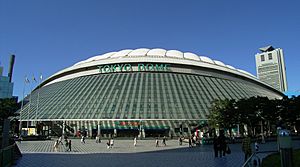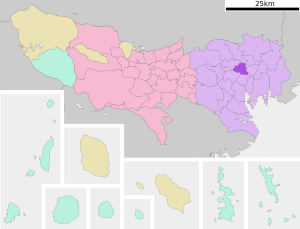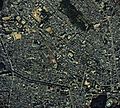Bunkyō facts for kids
Quick facts for kids
Bunkyō
文京区
|
|||||||||||
|---|---|---|---|---|---|---|---|---|---|---|---|
| Bunkyō City | |||||||||||

Tokyo Dome
|
|||||||||||
|
|||||||||||

Location of Bunkyō in Tokyo
|
|||||||||||
| Country | Japan | ||||||||||
| Region | Kantō | ||||||||||
| Prefecture | Tokyo | ||||||||||
| Area | |||||||||||
| • Total | 11.29 km2 (4.36 sq mi) | ||||||||||
| Population
(October 1, 2020)
|
|||||||||||
| • Total | 240,069 | ||||||||||
| • Density | 21,263/km2 (55,070/sq mi) | ||||||||||
| Time zone | UTC+09:00 (JST) | ||||||||||
| City hall address | Kasuga 1-16-21, Bunkyo-ku, Tokyo 112-6555 |
||||||||||
|
|||||||||||
Bunkyō (文京区, Bunkyō-ku) is a special area, like a city, located in the middle of Tokyo, Japan. It's known as a great place to live and learn. For a long time, famous writers, thinkers, and politicians have called Bunkyō home. You'll find exciting places like the Tokyo Dome, the Kōdōkan (a famous judo center), and the main campus of the University of Tokyo here. Bunkyō is also friends with a city in Germany called Kaiserslautern.
Bunkyō was created in 1947. It was formed by joining two older areas, Hongo and Koishikawa, after Tokyo became a big metropolis. Today, Bunkyō has different kinds of neighborhoods. Some parts, like Nezu and Sendagi, feel more traditional, like the old "Shitamachi" areas of Tokyo. Other parts are more like the "Yamanote" areas, which are often seen as more modern and upscale.
As of 2022, about 240,069 people live in Bunkyō. This includes around 8,500 people from other countries. The area is about 11.29 square kilometers, which means it's quite busy with many people living close together.
Contents
History of Bunkyō
Bunkyō was officially formed in 1947. This happened when the older areas of Hongo and Koishikawa joined together. This change was part of a bigger plan to transform Tokyo City into the Tokyo Metropolis.
Exploring Bunkyō's Geography
Neighborhoods and Districts
Bunkyō is made up of about twenty different neighborhoods. They are grouped into two main areas:
- Koishikawa Area
- Hakusan
- Kasuga
- Kohinata
- Koishikawa
- Kōraku
- Mejirodai
- Otowa
- Ōtsuka
- Sekiguchi
- Sengoku
- Suidō
- Hongō Area
- Hongō
- Honkomagome
- Mukōgaoka
- Nezu
- Nishikata
- Sendagi
- Yayoi
- Yushima
How Bunkyō is Governed
Bunkyō is led by its Mayor, Hironobu Narisawa. He is an independent politician, meaning he doesn't belong to a specific political party. However, he has support from major parties like the Liberal Democratic Party and Komeito. The city also has a council with 34 members who are chosen by the people.
Bunkyō's Economy and Businesses
Bunkyō is home to many important companies. For example, Kodansha, a big publishing company, has its main office here. Another company, Tomod's, which is a drugstore chain, also has its headquarters in Bunkyō.
A construction company called Penta-Ocean, which specializes in building things in the ocean and creating new land, is also based in Bunkyō. Even the famous car company Toyota has its Tokyo headquarters in this area.
Famous Places and Landmarks
Bunkyō has many interesting places to visit:
- Chinzan-so Garden
- Denzū-in Temple
- Gokoku-ji Temple
- Harimasaka Sakura Colonnade (a beautiful cherry blossom street)
- Hatoyama Hall
- Kisshō-ji Temple
- Kodansha Noma Memorial Museum
- Kodokan Judo Institute (a famous judo center)
- Koishikawa Botanical Garden
- Koishikawa Kōrakuen (a traditional Japanese garden)
- Nezu Shrine
- Nippon Medical School
- Rikugien Garden
- Shin-Edogawa Garden
- Tokyo Cathedral (St. Mary's Cathedral)
- Tokyo Dome (a famous stadium)
- Tokyo Dome City (an entertainment complex)
- Toshimagaoka Imperial Cemetery
- Toyo University
- Tōyō Bunko "Oriental Library" (Japan's largest library for Asian studies)
- University of Tokyo
- Yanaka Cemetery
- Yushima Seidō Temple
Education in Bunkyō
Bunkyō is a major center for education, with many universities and schools.
Universities and Colleges
National Universities
- Ochanomizu University
- University of Tsukuba Ōtsuka Campus
- University of Tokyo Hongō Campus
- Tokyo Medical and Dental University
Private Universities
- Atomi University
- Juntendo University
- Takushoku University
- Chuo University (Engineering department)
- Tokyo Woman's Christian University
- Toyo University
- Toyo Gakuen University
- Nippon Medical School
- Japan Women's University
- Bunkyo Gakuin University
- Bunkyo Gakuin College
- International College for Postgraduate Buddhist Studies
Primary and Secondary Schools
There are also high schools run by the national government and the Tokyo Metropolitan Government. The local Bunkyō Board of Education manages many public elementary and junior high schools.
Municipal Junior High Schools
- No. 1 Junior High School
- No. 3 Junior High School
- No. 6 Junior High School
- No. 8 Junior High School
- No. 9 Junior High School
- No. 10 Junior High School
- Bunrin Junior High School
- Hongodai Junior High School
- Meidai Junior High School
- Otowa Junior High School
Municipal Elementary Schools
- Aoyagi Elementary School
- Hayashicho Elementary School
- Hongo Elementary School
- Kagomachi Elementary School
- Kanatomi Elementary School
- Kohinata Daimachi Elementary School
- Komamoto Elementary School
- Kubomachi Elementary School
- Meika Elementary School
- Nezu Elementary School
- Otsuka Elementary School
- Rekisen Elementary School
- Sasugaya Elementary School
- Seishi Elementary School
- Sekiguchi Daimachi Elementary School
- Sendagi Elementary School
- Shiomi Elementary School
- Showa Elementary School
- Yanagicho Elementary School
- Yushima Elementary School
Culture and Museums
Bunkyō has many museums where you can learn about different things:
- Bunkyo Museum
- Eisei Bunko Museum
- Japanese Baseball Hall of Fame
- Kodansha Noma Memorial Museum
- Koishikawa Annex
- Koishikawa Ukiyo-e Art Museum
- Orugoru no Chiisana Hakubutsukan (a small music box museum)
- Printing Museum, Tokyo
- The University Museum, The University of Tokyo
- Tokyo Waterworks Historical Museum
- Yayoi Museum
Getting Around Bunkyō: Transportation
Train Stations
Bunkyō is well-connected by several subway lines, making it easy to travel around.
Toei Subway Lines
- Toei Mita Line: Sengoku, Hakusan, Kasuga, Suidōbashi stations
- Toei Ōedo Line: Iidabashi, Kasuga, Hongō Sanchōme stations
Tokyo Metro Subway Lines
- Tokyo Metro Chiyoda Line: Sendagi, Nezu, Yushima stations
- Tokyo Metro Marunouchi Line: Shin-Ōtsuka, Myōgadani, Kōrakuen, Hongō Sanchōme, Ochanomizu stations
- Tokyo Metro Yūrakuchō Line: Gokokuji, Edogawabashi stations
- Tokyo Metro Namboku Line: Kōrakuen, Tōdaimae, Honkomagome stations
Highways
The Shuto Expressway No.5 Ikebukuro Route also passes through Bunkyō, connecting it to other parts of Tokyo.
Famous People from Bunkyō
Many notable people have come from Bunkyō, including:
- Hayao Miyazaki: A world-famous Japanese animator and director, known for films like Spirited Away and My Neighbor Totoro. He also co-founded Studio Ghibli.
- Makiko Tanaka: A Japanese politician.
- Osamu Noguchi: The person who created Kickboxing.
- Kaito Ishikawa: A Japanese voice actor.
- Yukio Hatoyama: A Japanese politician who used to be the Prime Minister of Japan.
- Shinichiro Kobayashi: A Japanese photographer.
- Teiichi Matsumaru: A Japanese football (soccer) player.
- Hiroto Muraoka: Another Japanese football (soccer) player.
- Yu-ki Matsumura: A Japanese actor and singer.
- Yūko Minaguchi: A Japanese actress, voice actress, and narrator.
- Yukio Tsuchiya: A Japanese football (soccer) player.
Images for kids
See also
 In Spanish: Bunkyō (Tokio) para niños
In Spanish: Bunkyō (Tokio) para niños
 | Sharif Bey |
 | Hale Woodruff |
 | Richmond Barthé |
 | Purvis Young |








